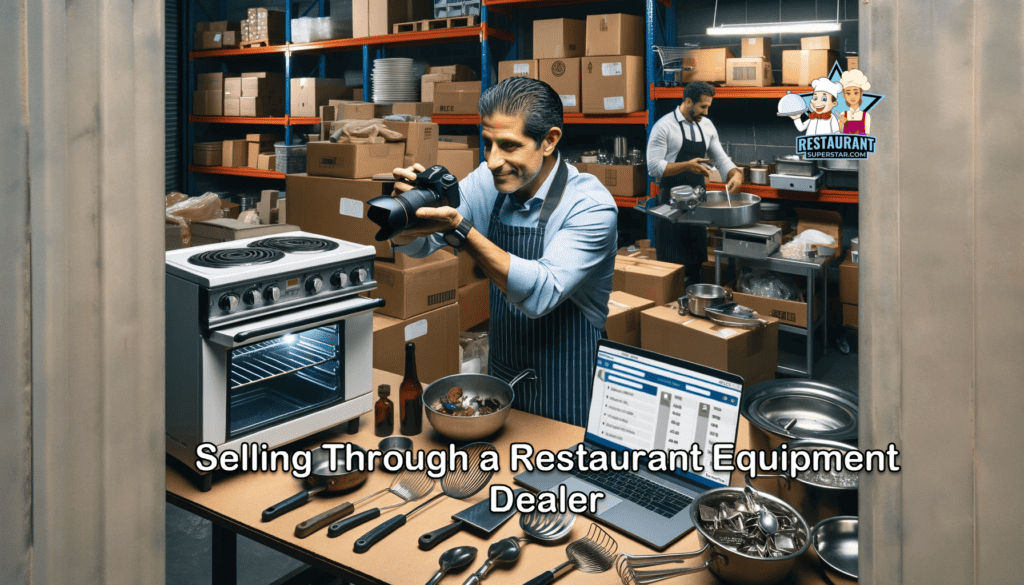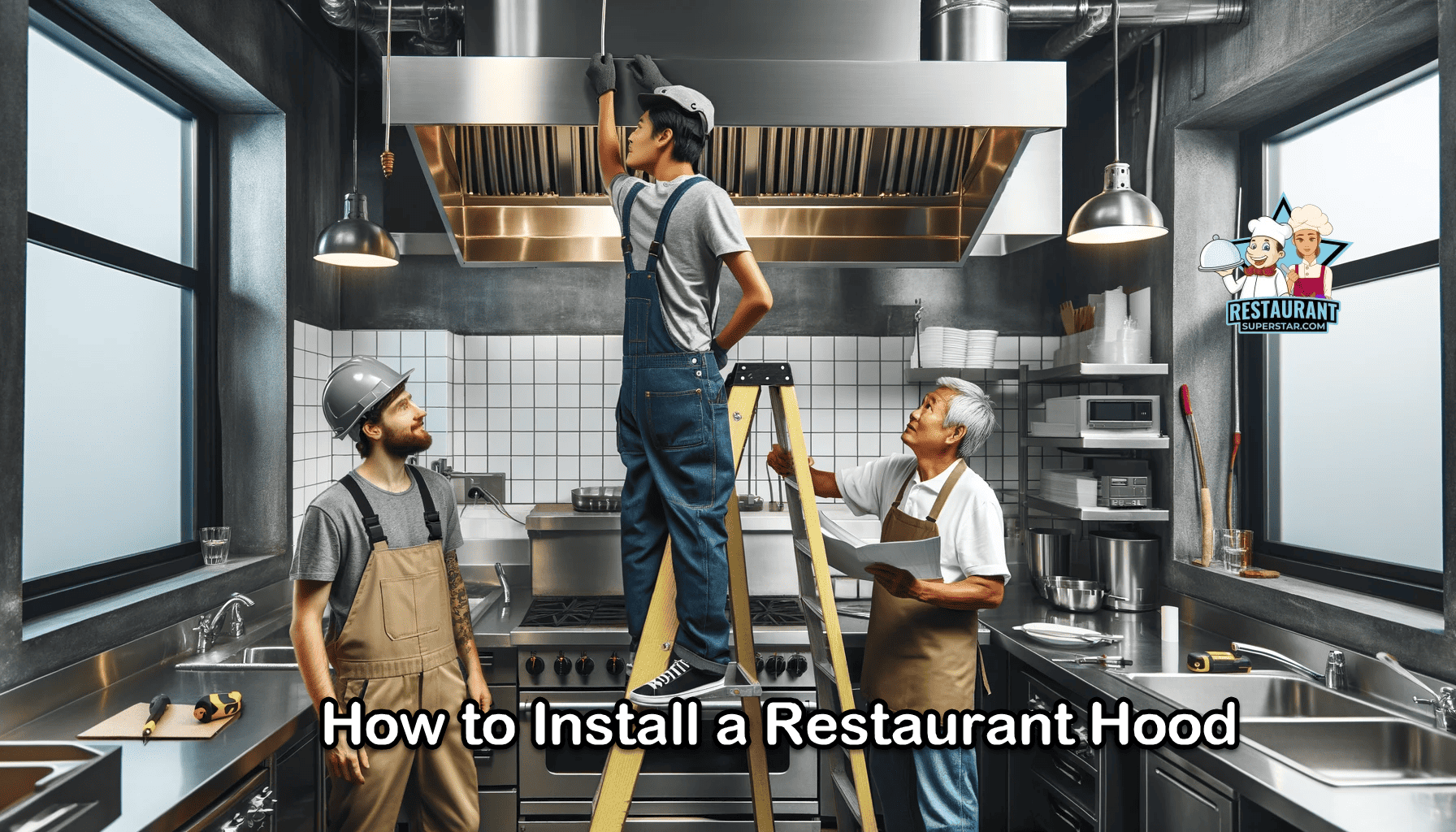Where Can I Sell Used Restaurant Equipment?
You are in the right place if you’re wondering, “Where Can I Sell Used Restaurant Equipment?” This article is a treasure trove of insights, answering your main query and unraveling many crucial aspects that will change how you view selling used kitchen gear. Your curiosity is about to be richly rewarded.
Where Can I Sell Used Restaurant Equipment?
Where Can I Sell Used Restaurant Equipment? The straightforward answer is through dealers, online marketplaces, or donating or recycling.
But hold on, it’s more complicated.
This article delves deep, laying out a detailed roadmap for new restaurant owners, aspiring young chefs, and anyone keen on navigating the world of kitchen equipment resale.
We’ll guide you through each step, ensuring you make informed decisions and maximize your returns.
Now that you can glimpse the answer, let’s dive into the exciting part.
This guide isn’t just a list; it’s a journey through the nitty-gritty of selling used restaurant equipment.
It’s about understanding your options, maximizing profits, and making the process smooth and efficient. Whether you’re decluttering, upgrading, or closing shop, we’ve got you covered.
The Strategic Approach to Selling Your Used Restaurant Equipment
Let’s face it: the restaurant business is as dynamic as it gets. Whether upgrading your kitchen, closing a chapter, or simply decluttering, finding the right way to offload your used equipment is crucial.
It’s not just about getting some extra cash in your pocket (though that’s a sweet bonus!), it’s about making intelligent, informed decisions that save you time and hassle.
Selling used restaurant equipment isn’t just a transaction; it’s a strategy. It’s about:
- Understanding Your Options: The choices are vast, from bustling online marketplaces to local dealers and auctions.
- Maximizing Your Returns: We all want the best bang for our buck, right?
- Efficiently Passing on Your Equipment: Whether it’s to the next passionate chef or a charity, your equipment has a subsequent chapter.
This guide is specially crafted for you – the go-getters in the culinary world.
We’re talking to the brave souls who took the plunge into restaurant ownership, the creative minds who love to cook, and anyone finding themselves with kitchen equipment that’s no longer needed.
We’ll walk you through each step, turning what might seem daunting into a smooth and successful journey.
So, buckle up as we dive into selling used restaurant equipment. By the end of this read, you’ll be equipped (pun intended!) with all the knowledge you need to make the best decision for your situation.
Let’s roll up our sleeves and get started!
Selling Through a Restaurant Equipment Dealer

Advantages: Quick, Hassle-Free Process
When you’re busy stirring the pot (literally and figuratively) in the culinary world, time is of the essence. Selling your used restaurant equipment through a dealer is like hitting the fast-forward button.
It’s quick, it’s convenient, and it’s a no-brainer. You don’t have to deal with the back-and-forth with buyers, setting up listings, or haggling over prices.
Dealers take the reins, leaving you more time to focus on your passion for food and running your business.
Disadvantages: Potentially Lower Profits
However, there’s a trade-off. Dealers are in this to make a profit, too. So, they’ll likely offer you a price below the market value.
It’s the cost of convenience. If you need more than squeezing every possible dollar out of the sale, there might be better routes than this. But if ease and speed are what you’re after, it’s a compromise worth considering.
How to Proceed
So, you’re leaning towards a dealer. Great! Here’s how to navigate this path:
Finding Reputable Dealers
- Do Your Homework: A quick online search for “restaurant equipment dealers near me” is a good start. But don’t stop there.
- Check Reviews: Look for dealers with positive reviews and testimonials. A good reputation is gold in this business.
- Ask Around: Network with other restaurant owners or chefs. Personal recommendations can lead you to the best dealers in town.
Preparing Equipment for Evaluation
- Clean It Up: First impressions matter. A good scrub can make your equipment more appealing and bump its value.
- Document Everything: Have all the necessary paperwork – purchase receipts, maintenance records, warranties, etc. Transparency builds trust.
- Know Your Stuff: Understand the basics of your equipment – its age, brand, model, and unique features. Being knowledgeable can help you negotiate better.
Remember, dealing with a reputable dealer can make selling your used restaurant equipment as smooth as a well-oiled kitchen machine.
It’s about finding the right balance between convenience and profit. With these tips, you’re well on your way to making a sale that suits your needs and lets you keep your culinary dreams sizzling.
Listing Equipment Online: Local Platforms
The online route to sell your used restaurant equipment opens up a world of possibilities. This can be a game-changer, especially for new restaurant owners or young chefs looking to reach a local audience.
Let’s explain how you can tap into local online platforms to turn your equipment into cash.
Facebook Marketplace
Facebook Marketplace has emerged as a go-to platform for selling smaller restaurant equipment with its easy local reach and user-friendly interface. Here’s how to create an effective listing that stands out and attracts the right buyers in your area.
Steps to Create an Effective Listing
Take High-Quality Photos
- Visual Appeal: Snap clear, well-lit photos of your equipment from multiple angles. Make sure the background is clean and uncluttered.
- Showcase Condition: Highlight any unique features or aspects that indicate the equipment’s condition.
Write a Compelling Description
- Be Clear and Concise: Provide essential information like the make, model, age, and usage history of the equipment.
- Highlight Key Features: Mention anything that makes your item stand out, like energy efficiency, compact size, or any included accessories.
Set a Fair Price
- Competitive Pricing: Research what similar items are selling for on Marketplace. Set a competitive yet fair price based on the condition and brand of your equipment.
- Be Open to Negotiations: Indicate if your price is firm or open to offers. This can help manage buyer expectations.
Respond Promptly to Inquiries
- Engagement is Key: Quick responses to potential buyers’ questions or offers can make a significant difference in securing a sale.
Safety and Convenience in Transactions
- Public Meet-Up: Arrange to meet in a public place, especially for smaller, quickly transported items.
- Payment Methods: Be transparent about accepted payment methods. Options like cash, digital payments, or secure services can be discussed.
Leveraging Facebook Marketplace’s Local Reach
- Community Groups: Consider posting about restaurant equipment or business supplies in local Facebook groups to increase visibility.
- Regular Updates: Refresh your listing periodically to keep it visible in search results and buyers’ minds.
By following these steps, you can effectively harness the power of Facebook Marketplace to sell your smaller restaurant equipment.
It’s a platform that combines the convenience of online selling with the advantage of reaching local buyers, making it an excellent option for those pondering, “Where Can I Sell Used Restaurant Equipment?”
Craigslist: A Go-To for Selling Larger Equipment
Craigslist is a tried-and-true platform for selling larger restaurant equipment. Its widespread use and straightforward listing process make it ideal for reaching a local audience interested in substantial items.
Let’s dive into how you can navigate this platform effectively, focusing on negotiations and safety.
Creating a Listing that Attracts Buyers
Highlight Equipment Details
- Be Specific: Include brand, model, size, and technical specifications. The more information, the better.
- Condition Matters: Clearly state the equipment’s condition, usage history, and any repairs or maintenance it has undergone.
Set the Right Price
- Market Research: Look up similar equipment on Craigslist to gauge a fair price.
- Be Flexible: Indicate if the price is negotiable. This can invite more inquiries and potential offers.
Navigating Negotiations
- Be Prepared: Know the lowest price you’re willing to accept before negotiating.
- Communication is Key: Respond promptly to inquiries and be open to questions. Honest communication can lead to successful negotiations.
- Hold Firm on Fair Offers: If you believe an offer is reasonable, don’t be afraid to stand your ground.
Safety Tips for Craigslist Transactions
- Public Meetups: Always meet in a public place, preferably during daylight hours. A public parking lot near your location can be a good choice for large items.
- Bring a Friend: If you have to show the equipment at your place of business, it’s wise to have someone with you for added security.
- Cash Transactions: For Craigslist, cash is king. Avoid complicated payment methods that could lead to scams.
- Inspect Equipment at Pickup: Ensure the buyer inspects the equipment during pickup to avoid disputes later.
- Be Cautious with Personal Information: Limit the personal information you share. Use the Craigslist email relay service instead of giving out your personal email or phone number.
By leveraging Craigslist’s platform for your larger restaurant equipment, you stand to reach a wide array of local buyers.
You can make the selling process smooth and secure with the correct pricing, negotiation, and safety approach. So, for those wondering, “Where Can I Sell Used Restaurant Equipment?” Craigslist offers a robust, local-focused solution.
National Platforms
Going beyond local boundaries can open up opportunities when selling used restaurant equipment.
National platforms provide a larger audience, potentially leading to better offers and a quicker sale. Let’s explore some of the most influential national platforms you can use.
eBay
eBay is a powerhouse for selling high-demand restaurant equipment to a broad audience. It’s particularly effective for items that attract much interest, from specialty appliances to popular kitchen gadgets.
Here’s how you can navigate eBay to maximize your selling potential.
Steps for Effective Selling on eBay
Identify High-Demand Items
- Research: Look for similar items on eBay to gauge demand. High-demand items often have multiple bidders and a history of successful sales.
- Unique Selling Points: Highlight any unique features or brands sought after in the restaurant equipment market.
Creating Your Listing
- High-Quality Images: Capture clear, detailed photos from various angles to showcase the condition and features of your equipment.
- Compelling Description: Provide a thorough description, including brand, model, age, usage, and any unique characteristics or benefits.
Pricing Strategy
- Competitive Pricing: Set a starting price that’s appealing yet realistic based on your research.
- Auction vs. Fixed Price: Choose between an auction format, which can increase the price for high-demand items, or a fixed price for quicker sales.
Managing Listing Fees and Shipping
- Listing Fees: Familiarize yourself with eBay’s fee structure, including insertion and final value fees.
- Shipping Considerations: Consider local pickup options for more oversized items to avoid high shipping costs. State shipping terms and costs in your listing.
- Shipping Insurance: For valuable items, shipping insurance can protect you against loss or damage during transit.
Tips for Successful eBay Selling
- Customer Interaction: Promptly respond to buyer inquiries and provide excellent customer service to build a positive reputation.
- Feedback System: Encourage buyers to leave feedback. A strong feedback profile can make future sales more accessible.
- Payment Security: Use secure payment methods eBay offers, like PayPal, to protect against fraud.
Selling on eBay allows you to tap into a vast market, increasing your chances of finding the right buyer to pay a fair price for your used restaurant equipment.
You can make the most of this national platform by focusing on high-demand items, managing listing fees strategically, and considering shipping logistics.
So, for those pondering, “Where Can I Sell Used Restaurant Equipment?” eBay presents an expansive, potentially lucrative avenue.
Specialized Restaurant Equipment Websites
Leveraging Niche Platforms
When selling used restaurant equipment, sometimes the best strategy is to go where the enthusiasts and experts are.
Specialized restaurant equipment websites are niche platforms that cater specifically to the culinary and hospitality industry. These sites can effectively reach a targeted audience that understands your selling value.
Identifying the Right Niche Platforms
Research Specialized Sites
- Industry-Specific: Look for websites that specifically cater to restaurant equipment sales. Examples include WebstaurantStore’s used equipment section or The Restaurant Warehouse.
- Reputation Matters: Check user reviews and testimonials to gauge the credibility and effectiveness of the platform.
Understand the Audience
- Targeted Buyers: These platforms are frequented by industry professionals who know precisely what they’re looking for, which can lead to quicker and more efficient sales.
Using Niche Platforms Effectively
Create Detailed Listings
- Speak Their Language: Use industry-specific terminology to describe your equipment accurately.
- Highlight Key Features: Emphasize durability, brand reputation, energy efficiency, or recent upgrades.
Pricing Strategy
- Know Your Market: Understand the value of your equipment in the industry. Price competitively, but don’t undervalue specialized or high-end items.
Engage with Potential Buyers
- Be Responsive: Quick replies to inquiries show professionalism and can help seal the deal.
- Offer Expertise: Share your knowledge about the equipment, its uses, and maintenance tips.
Advantages of Niche Platforms
- Focused Audience: Your listings are seen by people specifically looking for restaurant equipment, increasing the likelihood of a sale.
- Higher Price Points: Due to the specialized nature of the audience, you can command higher prices for quality equipment.
- Industry Networking: These platforms can also be a great way to connect with other professionals in the restaurant industry.
By choosing specialized restaurant equipment websites, you’re tapping into a concentrated market of potential buyers who understand the value and utility of what you’re offering.
This targeted approach can be efficient for unique or high-end equipment that might be overlooked on broader platforms.
So, for those asking, “Where Can I Sell Used Restaurant Equipment?” these niche platforms offer a tailored solution that can match your specific selling needs.
Offline Selling Options: Navigating the Traditional Route
Restaurant Equipment Dealers
When selling used restaurant equipment, a significant market still operates offline. One of the most prominent offline options is selling through restaurant equipment dealers. This method offers different advantages and considerations compared to online selling.
Compared to Online Selling
- Speed and Convenience: One of the main advantages of selling to a dealer is the speed of the transaction. Unlike online selling, where you might wait for the right buyer, dealers can often make an offer and complete the purchase quickly.
- Less Hassle: Selling offline eliminates the need to create listings, manage online inquiries, and arrange shipping or pickups.
- Personal Interaction: Dealing with buyers in person can sometimes lead to better negotiations and understanding, mainly if you have specialized or high-value equipment.
Quick Sale vs. Profit Trade-Offs
- Immediate Payment: Dealers typically offer immediate payment, which is ideal if you need quick funds.
- Lower Offers: However, dealers are looking to resell at a profit, so their offers may be lower than what you could get from private buyers online.
- No Shipping Worries: When selling to a local dealer, you don’t have to deal with the logistics and costs of shipping, especially for bulky items.
Tips for Selling to Dealers
- Research and Compare: Visit multiple dealers to get a sense of fair pricing for your equipment.
- Negotiate Wisely: Be prepared to negotiate. Knowing the market value of your equipment will give you an edge.
- Prepare Your Equipment: Like online, ensure your equipment is clean and in good working order to fetch the best price.
While online platforms offer a broad reach, selling through restaurant equipment dealers provides a different level of ease and immediacy.
It’s an excellent option for those who prefer a straightforward, quick sale and are willing to trade off higher profits for convenience.
Auctions: A Dynamic Way to Sell Restaurant Equipment
Navigating the World of Auctions for Equipment Sale
Auctions, both local and online, can be an exciting and potentially profitable way to sell used restaurant equipment.
They offer a unique platform where competitive bidding sometimes results in higher selling prices. Understanding how to prepare for an auction and the associated fees is crucial for a successful sale.
Preparing for an Auction
Select the Right Auction House
- Reputation and Specialization: Choose an auction house known for dealing with restaurant or commercial equipment.
- Local or Online: Decide whether a local auction house or an online auction platform suits your needs.
Understand the Terms and Conditions
- Consignment Terms: Review the terms for consignment, including how your equipment will be stored and presented.
- Auction Timeline: Be clear about the timeline, from listing to the auction date.
Prepare Your Equipment
- Clean and Repair: Ensure your equipment is in the best possible condition. Clean it thoroughly and make minor repairs if needed.
- Documentation: Provide any available manuals, maintenance records, or warranties.
Understanding Fees and Potential Profits
- Seller’s Fees: Be aware that auction houses typically charge a seller’s fee or commission, a percentage of the sale price.
- No Sale, No Fee: Some auctions operate on a ‘no sale, no fee’ basis, meaning if your equipment doesn’t sell, you aren’t charged.
- Potential for Higher Profits: The competitive nature of auctions can drive up prices, especially for sought-after or unique items.
- Reserve Price: Set a reserve price to ensure your equipment sells for at least what you’re willing to accept.
The Auction Advantage
Participating in an auction can effectively reach serious buyers ready to bid on quality restaurant equipment.
While it requires some preparation and understanding of the process, auctions can balance higher profits and the excitement of a competitive selling environment.
So, when exploring answers to “Where Can I Sell Used Restaurant Equipment?” consider the dynamic world of auctions as a viable option.
Other Essential Tips for Selling Used Restaurant Equipment
Photography and Descriptions
Whether listing your used restaurant equipment online or creating a portfolio for an auction, the power of high-quality photography and compelling descriptions cannot be overstated.
These elements are crucial in attracting potential buyers and giving them a clear understanding of what you’re offering.
Importance of High-Quality Photos
First Impressions Count
- Professional Appearance: High-quality images make your listing look professional and trustworthy.
- Highlight Features: Use photos to showcase the condition of the equipment and any special features.
Tips for Great Photography
- Good Lighting: Take photos in well-lit conditions to avoid shadows and highlight the details of the equipment.
- Multiple Angles: Include pictures from different angles and close-ups of important features or wear and tear.
- Clean Background: Use a neutral background to ensure the focus remains on the equipment.
Writing Compelling, Clear Descriptions
Be Detailed and Honest
- Specifications: Include the make, model, age, and technical specifications.
- Condition: Clearly state the condition of the equipment, mentioning any repairs or issues.
Engage the Buyer
- Tell a Story: Explain how the equipment has contributed to your restaurant’s success or any unique features that make it stand out.
- Be Clear and Concise: Use easy-to-understand language while being thorough.
Keywords and SEO
- Use Relevant Keywords: Incorporate keywords like “used restaurant equipment” to improve search visibility.
- Mobile-Friendly: Ensure your description is easy to read on mobile devices, as many buyers browse listings on their phones.
The Power of Presentation
Good photography and well-crafted descriptions can significantly increase the chances of your equipment catching the eye of potential buyers.
They provide a visual and descriptive window into the quality and value of your equipment, making it easier for buyers to make informed decisions.
So, when pondering, “Where Can I Sell Used Restaurant Equipment?” remember that how you present your equipment is just as necessary as where you list it.
Pricing Strategies: Setting the Right Price for Your Used Restaurant Equipment
Navigating the Art of Pricing in the Equipment Resale Market
One of the most crucial aspects of selling used restaurant equipment is determining the right price. It balances attracting buyers and ensuring you get fair value for your items.
Let’s delve into practical strategies for pricing your equipment competitively.
Researching Market Prices
Understand the Market
- Compare Similar Listings: Look at current and past listings of similar equipment to gauge the going rates.
- Condition Matters: Adjust your price based on the age, condition, and brand of your equipment compared to others on the market.
Consider Demand
- High Demand, Higher Price: If your equipment is in high demand (like popular brands or specific machinery), you can price it higher.
- Seasonal Trends: Be aware of seasonal trends in the restaurant industry that might affect demand and prices.
Pricing Competitively
Strike a Balance
- Fair Pricing: Set a fair price for you and the buyer. Remember, overpricing can deter potential buyers while underpricing might lead to quick sales but lower returns.
Be Open to Negotiation
- Flexibility: Indicate if you’re willing to negotiate the price. This can attract more buyers and lead to a faster sale.
- Know Your Bottom Line: Understand the lowest price you’re willing to accept before negotiations start.
Adjust as Needed
- Market Response: If your equipment isn’t selling, be prepared to adjust the price. Monitor how buyers are responding and be flexible.
The Right Price Makes a Difference
Setting the right price for your used restaurant equipment is vital to a successful sale. It’s about doing homework, understanding the market, and being adaptable.
A competitive price attracts potential buyers and ensures you get a fair return on your investment.
So, when figuring out “Where Can I Sell Used Restaurant Equipment?” invest time in determining “How Much Can I Sell My Used Restaurant Equipment For?”
Negotiation Skills: Mastering the Art of the Deal in Equipment Sales
Selling used restaurant equipment often involves negotiation. Whether you’re dealing face-to-face with a buyer or responding to offers online, practical haggling skills can significantly affect your final sale price.
Moreover, patience plays a crucial role in finding the right buyer who sees the value in your equipment. Let’s explore how to sharpen these skills for better outcomes.
Know Your Equipment’s Worth
- Informed Seller: Understand the value of your equipment based on its condition, age, brand, and market demand. This knowledge is your most vital tool in negotiations.
Communicate Clearly
- Open Dialogue: Be clear and upfront about the features and condition of your equipment. Honesty fosters trust and can lead to better negotiation outcomes.
- Active Listening: Pay attention to what the buyer is saying. Understanding their needs can give you an edge in the negotiation.
Be Flexible, Yet Firm
- Room for Compromise: Show willingness to negotiate, but be firm on your minimum acceptable price.
- Creative Solutions: Sometimes, negotiation isn’t just about price. Terms of payment, delivery, or add-ons can be part of the deal.
Patience in Finding the Right Buyer
- Avoid Rush Decisions: Only feel pressured to accept the first offer if it meets your expectations. Sometimes, waiting a bit longer can lead to better offers.
- Market Dynamics: Understand that selling certain types of equipment can take time, depending on market demand and seasonality.
- Stay Positive and Persistent: Keep your listing updated and engage with potential buyers. The right buyer who sees the value in your equipment will come along.
Conclusion
Negotiating the sale of your used restaurant equipment is a skill that combines knowledge, communication, and patience.
You can significantly improve your chances of a successful and profitable sale by mastering effective haggling techniques and exercising patience.
So, as you ponder “Where Can I Sell Used Restaurant Equipment?”, consider “How Can I Get the Best Deal for My Used Restaurant Equipment?”
As we end this comprehensive guide on “Where Can I Sell Used Restaurant Equipment?”, let’s recap the key takeaways and leave you with some final thoughts to guide your decision-making process.
Key Takeaways
- Multiple Avenues for Sale: Whether through a dealer, online platforms, auctions, or even offline methods, you have various channels to sell your used restaurant equipment.
- Preparation is Key: From cleaning your equipment to taking high-quality photos and writing detailed descriptions, preparation can significantly impact your sales success.
- Understand Pricing and Negotiation: Researching market prices, setting competitive rates, and honing your negotiation skills are crucial to getting a fair deal.
- Alternative Options: Remember to donate or recycle as viable options, especially if they align more closely with your values or current needs.
- Patience Pays Off: Waiting for the right buyer sometimes yields better results than rushing into a sale.
Choose What Suits You Best
Every seller’s situation is unique, as is every piece of restaurant equipment. Consider what matters most to you – is it the speed of the sale, the price you can achieve, or perhaps the ease and convenience of the transaction?
Maybe it’s about sustainable disposal or supporting a charitable cause.
Reflect on these factors and choose the best method with your goals and circumstances.
Remember, selling your used restaurant equipment isn’t just about the transaction; it’s about making smart choices that benefit you, the buyer, and potentially even the wider community.
Take the insights from this guide, apply them to your situation, and embark on your selling journey with confidence and clarity.
Jeff Smith is a Restaurant Consultant with over 20 years of hospitality experience ranging from server to owner and general manager. He focuses on Restaurant POS technology as well as restaurant marketing. Check out our world-famous restaurant resources page for a comprehensive offering of hand-picked resources and tools to help your business. You can also check out some of our other restaurant business articles.





